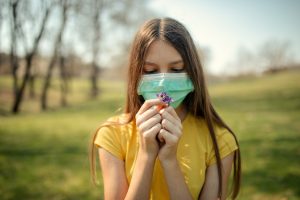With Spring now upon us, more and more people are taking advantage of the nicer weather and spending significant time outdoors, but this change in season can also bring the return of allergies for many. For some, these allergic reactions could be confused with symptoms of Covid-19. Flushing Hospital wants to offer our community with tips on how to tell the difference between seasonal allergies and Covid.
While the symptoms of allergies and Covid-19 can be similar, there are some definitive ways to tell which you are experiencing so you can treat it appropriately.
Typically, a virus such as Covid-19 causes a system-wide response, while an allergy, which is an overreaction of the immune system in response to exposure to a trigger, is usually more localized. For instance, someone with Covid-19 may have a fever, body aches, chills, a sore throat, weakness, and respiratory symptoms. On the other hand, someone with allergies will be more likely to have the symptoms centered on the nose, eyes, and throat, and they usually will not have a fever.
In addition, allergies cause itchiness: itchy eyes, itchy nose and sneezing, and a tickle in the throat, while itchiness is usually not a symptom of illness. COVID-19 also does not seem to cause much in the way of nasal symptoms, which means if your child is sneezing a lot, it is more likely allergies and isn’t related to COVID-19.
To treat allergies, your doctor may recommend using allergy medications to prevent or manage the symptoms. This can include antihistamines (a medication that blocks histamine, a chemical your body releases when exposed to a trigger), nasal corticosteroids (prescription medications that relieve symptoms by reducing inflammation in your nasal passages), and if you also have asthma, a rescue asthma inhaler (this contains a medication that opens airway passages) and inhaled corticosteroids (this reduces the inflammation in your airways).
In addition, there are some things you can do to limit your chances of experiencing allergy symptoms, including:
- Wear a hat and sunglasses to prevent pollen from getting in your eyes.
- Remove your clothes as soon as you come home and wash them remove allergens.
- Wash your child’s hands and face as soon as they come in from the outdoors.
It is important to note that you can have seasonal allergies and still contract Covid, so it is important to not dismiss the possibility of one just because you have the other. If you have any suspicions, it is important to consult with your physicians. To make an appointment with a doctor at Flushing Hospital’s Ambulatory Care Center, please call 718-670-5486.
All content of this newsletter is intended for general information purposes only and is not intended or implied to be a substitute for professional medical advice, diagnosis or treatment. Please consult a medical professional before adopting any of the suggestions on this page. You must never disregard professional medical advice or delay seeking medical treatment based upon any content of this newsletter. PROMPTLY CONSULT YOUR PHYSICIAN OR CALL 911 IF YOU BELIEVE YOU HAVE A MEDICAL EMERGENCY.

